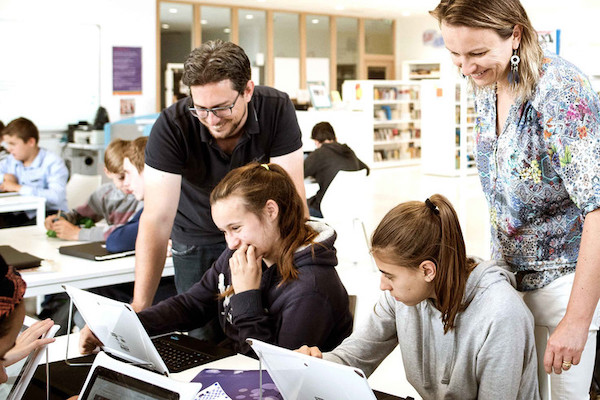Created in 2019, the School Evaluation Council is to independently evaluate the organization and performance of school education.
The first national report of this new institution presents an initial assessment of the content that emerges from the evaluations, globally and through four themes: education for sustainable development, the fight against harassment, the place of digital technology and European and international openness.
Nearly 950 schools have been evaluated for the 2020-2021 school year, i.e. a little more than 9% of all public and private secondary schools under contract (middle schools, general and technological high schools, vocational high schools).
The national report of this first evaluation campaign is based on the analysis of a sample of 100 randomly selected evaluation reports using a list of keywords.
With 443 items in the hundred institutional reports, the School's Evaluation Council observes "the regular, but not systematic, presence of items related to the place of digital technology.
- The themes associated with digital technology are communication, infrastructure and equipment, as well as pedagogy, which accounts for two-thirds of the items.
- There are also items related to digital uses, training and human resources, as well as the benefits and dangers of their use.
"Digital tools are primarily approached through the lens of communication with families."
The Council for School Evaluation identifies in these evaluation reports a question "about the most appropriate ways for parents to monitor their children's work, results and school life" . "Particular attention is paid to the families furthest from the school through the means of mitigating the effects of the digital divide and the risks induced by the increasing use of dematerialized procedures."Digital tools, particularly Pronote (advantages, disadvantages, competition from Twitter or Whatsapp), are also questioned."Financed by the communities, the ENT and its functionalities, " not always exploited, are valued in the evaluation reports as educational resources and means of communication".
The infrastructure and equipment " are subject to a description of what is provided or a judgment as to their degree of obsolescence, which depends on the relationship between the institution and the community, or its unequal use by teachers and students."
The pedagogical integration of these tools allows for the renewal of practices, collaborative work, evaluation by competence and differentiation, thanks to pedagogical diversification, personalized monitoring of students, their learning and their career paths.
The uses show a discrepancy between the idea of students at ease(digital native) and a more contrasted reality, revealed by the health crisis, which can be remedied thanks to the ENT or the PIX certification.
The school reports mention training needs, "with practices that do not always keep up with the resources and digital tools available, and a particular emphasis on the resource persons to be mobilized."
"Digital technology is appreciated for what it allows as much as it is feared for its complexity, its influence and the questioning of practices that it imposes.
The dangers, notes the School Evaluation Council, " are mainly related to social networks, with adults at a loss, the link to media and information education being insufficient for a situation that goes beyond the school and questions the role of parents. The benefits are to be found around languages and culture, with digital technology as a tool for exchange and rapprochement (eTwinning program, for example) .While the health crisis has allowed for the development of skills related to the use of digital technology, a harmonization of these uses and greater proximity between adults, students and families, "it has also brought to light the digital divide (dropping out of school, monitoring difficulties), cyber-violence and sometimes the perceived time-consuming nature of digital technology.
In conclusion, notes the School Evaluation Council, " digital technology is appreciated for the simplification of presentation and exchange that it allows as much as it is feared for its complexity, its influence and the questioning of practices that it imposes. Diversely apprehended by the institution and its agents, it is as much a revelation of the new as of the fragilities and tensions that run through education.
The School Evaluation Council
The School Evaluation Council is responsible for the independent evaluation of the organization and results of school education.Its main missions are to :
- ensure consistency in national and international assessments,
- advise on the methodologies, tools and results of these assessments
- define the methodological framework and tools for self-evaluations and evaluations of institutions,
- to establish a synthesis of the various evaluation studies on student achievement, educational systems and schools
Références :





